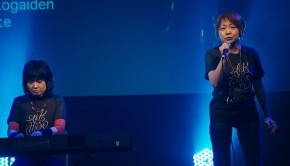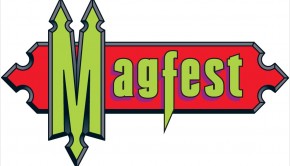Triforce Quartet Interview: Hey! Listen!
The Triforce Quartet is a unique ensemble that plays with the boundary between classical music and game scores. The four classically trained musicians got together in 2007 to perform a Legend of Zelda medley, and since then have grown into an ensemble that tours to perform at conventions and festivals like PAX Prime, PAX East, MAGfest, iDIG, and Video Games Live.
In our continuing our series of MAGfest interviews, the Triforce Quartet speaks with us over Google Hangouts, sitting on a couch and using a selfie stick to record themselves as we talk. The setup of the interview reflects the nature of our conversation – as the Quartet talks about how they formed, their work on Indiegogo and at MAGfest, and some of their more memorable arrangements, the group frequently jumps in to finish sentences, make jokes, and laugh with each other, setting the tone of a group that has formed a tight bond over the course of the years and thoroughly enjoys working together.
Note: The Triforce Quartet will be performing this weekend at iDIG Music Festival in Dublin. Those still interested in buying tickets can use the promo code “triforce” to receive a 50% discount when purchasing iDIG tickets here. Additionally, the Triforce Quartet will be playing at MomoCon from May 26-May 29.
Interview Credits
Interview Subjects: Jacob Roege, Chris Ferrara, Chad Schwartz, Stanley Beckwith
Interviewer: Emily McMillan
Editor: Emily McMillan
Coordination: Emily McMillan, Chad Schwartz
Interview Content
Emily: Let’s start with your origin story; how did you all get together to form the Triforce quartet?
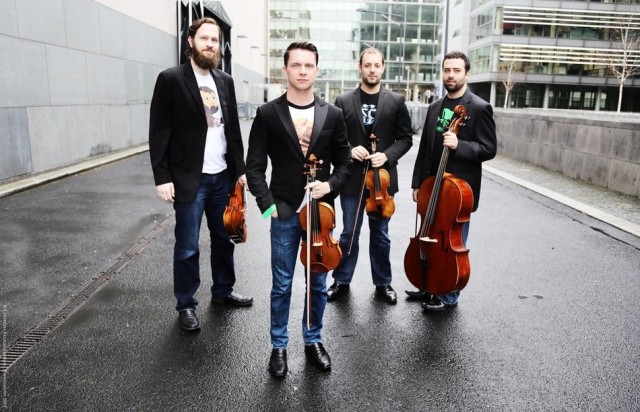
Jacob Roege: Ok, we met on Tinder…
Chris Ferrara: Oh god!
Chad Schwartz: [Laughs] So this kind of started in 2006. I had… wait, how long of the story you want? I can do the-
Jacob Roege: Shortest version!
Chad Schwartz: Okay, I will do the smallest version. Basically I heard a Hyrule Symphony arrangement from the Zelda Quartet, and I thought it was awesome, and I arranged it by ear and performed it for my senior recital at James Madison, and I just had my friends play with me. Chris was one of them, and Jake was there, but he wasn’t playing. I put it on YouTube, and then it went viral that summer, since it was kind of before video game music was really a big thing and it was one of the first video game music covers on YouTube. After that I did a couple more – Mario, Final Fantasy, and then…well, how did we all get together? Originally, I would just find anybody that would play, because I didn’t know anyone that was really into games.
The thing that really got it taking off was when we did the Smithsonian Institute exhibit “The Art of Video Games.” That was really huge – and then after that, we finally kind of formed the group, and we have been playing since then! Chris, Jake, and I went to the same college – James Madison – and Stanley and I were in the same high school; we’ve actually played in the same quartet since we were in seventh grade.
Emily: You said that it is hard to find people who are as into video game music as you – are all four of you interested in video game music, or are any of you in it for a new music experience?
Jacob Roege: We would not be able to do the stuff we do if all of us were not actually really into it.
Stanley Beckwith: I can’t say that I was super into video game music before joining the group but –
Jacob Roege: But we are all into video games.
Stanley Beckwith: We are all into video games, that’s really it. To get into learning the intricacies that this music has opened up the door to – I think classical musicians don’t take it seriously, but playing with the group really opened up the opportunity to love game music, and I think we all do at this point.
Chris Ferrara: For me, I wasn’t so into the video game cover thing but I listened to soundtracks all time. Jake knows this from James Madison University, but when everyone went on a vacation or something, I was playing Age of Empires or Starcraft or whatever, so I listened to a lot of the soundtracks from them, but I only recently got into the video game cover stuff once we started becoming a group.
Emily: Video game cover artists don’t always overlap with being professional musicians so it is a unique group that you guys have. When you are choosing your covers, do you think of pieces well suited for a quartet, or just find pieces you really like, and figure out a way to somehow make it work?
Stanley Beckwith: The latter.
Chad Schwartz: I think both. At the beginning, I was much more careful of what I was arranging because I wanted to make sure it worked. A lot of people would say why don’t you do this track or game – something like that – I kind of said, “It’s just not going to sound good” trying to get a 150 orchestrations into four parts. There’s no way to make a good sound from it. I also used to say that about versions like FFVIII boss theme – I was like, “We would never be able to do that” – But now we do it! [laughs] I mean, as we’ve grown as a group, we try to open ourselves up to more pieces that we didn’t think were possible before. However there’s definitely stuff out there that I just don’t arrange because I don’t think it will work well for us
Emily: Do you do most of the arrangements?
Chad Schwartz: So far, I have done all of the arrangements…so I would say yes to that question. [laughs] This summer we’re going to be crazy arranging, I’m telling you.
Chris Ferrara: Yeah, he said that last year, too.
Emily: You have that upcoming album that you crowdsourced on Indiegogo; what’s that experience been like?
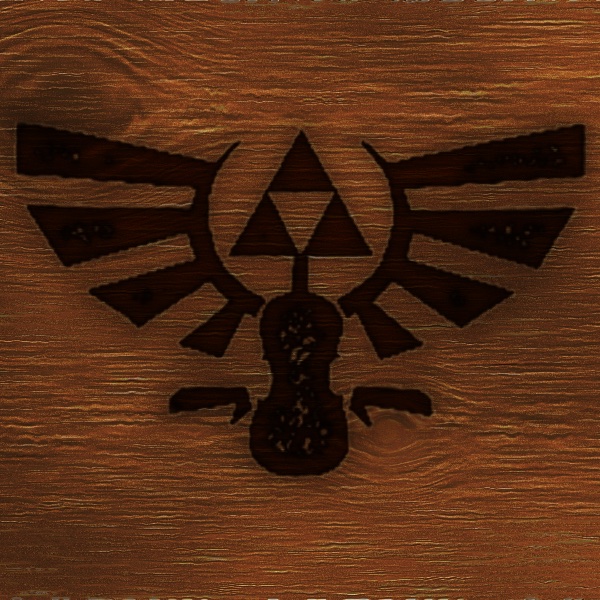
Chris Ferrara: Well we had the idea of what we were going to do with our first album, but none of us had any experience doing it. Over the years we have been playing a lot of shows – we went to PAX, we went to MAGfest opening many times, we did PAX Boston and Prime and then we did iDIG so we gained kind of a following. We figured, maybe we should do something like Kickstarter and Indiegogo to kind of stem the cause a little bit. So we went for it and it has been shockingly great, you know within the first 48 hours we raised almost $3,000, so it’s been quite surprising.
[at this point, our interview was interrupted by a dog jumping up in front of the camera]
Emily: Oh, who is that?
Jacob, Chris, Chad: This is Zelda.
Chris Ferrara: She’s Chad’s dog.
Jacob Roege: You can tell her she’s not being interviewed.
Emily: Zelda could make a good Triforce interview guest.
[Zelda then settled down a bit]
Chris Ferrara: A reason why we wanted to do the album was because if you look it like Tommy Tallarico with Video Games Live, and if you look at a lot of other cover groups that are a little bit bigger, it’s shocking how passionate – in a good way, of course – how passionate about video games people are in general and how much they really love it. People really do want to support it, and it’s great.
Emily: One of the highlights of MAGfest was the Journey Live performance. I really enjoy classical music as well, and when I’m at the symphony, people are there and kind of looking sleepy or playing at their phones or whatever – at the Journey performance everybody was just sitting there staring like rapt at the screen and at the orchestra. So it does seem like – even for classically oriented ensembles – there’s this huge passion for them.
Stanley Beckwith: A thing I really like about Journey is that you have the orchestra in front of the screen with the game. More modern audiences don’t necessarily know what to look at when you are at just a regular symphony concert, so having the game there to really focus the experience is different. I am not saying that the normal symphony is bad, but I think it grabs people’s attention in a different way at least a little bit from a normal symphonic concert does and that is really cool.
Jacob Roege: Well another thing I think when you also as a person who has played the game before you also notice little things that you didn’t notice when you were playing through it, like the swells in the music when you get to the part where you learn different spoilers in the story. When it’s live, and you’re watching it, you’re thinking, “Oh wow, yeah, that’s what made that part so great in the game.”
Chad Schwartz: That reminded me a couple years ago, I went to see Lord of the Rings Live where the NSO played the entire soundtrack to the movie and you got to watch the movie with the live music. Journey is like the next step from that because they still had to react to what is happening on the screen so it’s really cool.
Emily: You guys also generated quite a crowd when you came and did that impromptu concert [at MAGfest]! At the third – or second? – floor gazebo.
Chad Schwartz: It was very impromptu! We didn’t even know we were doing it until about two hours before or so, and we still didn’t know for certain until five minutes before.
Emily: Where did that decision come from?
Chad Schwartz: Well, we’ve done it in the past…
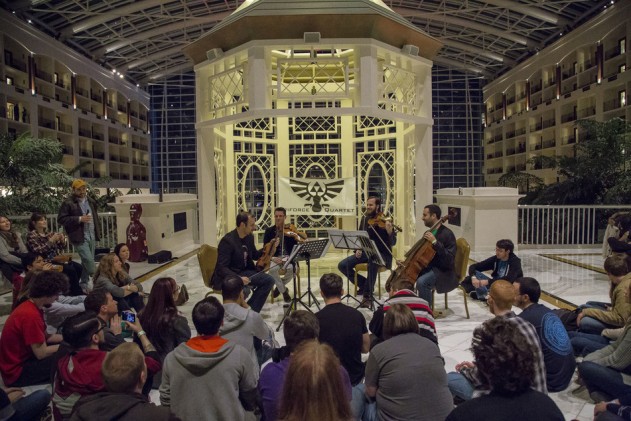
Jacob Roege: The thing is that we’ve done it – I think we’ve done it the last three years now, and when people found out that we were not playing at MAGfest this year, one reason why they were upset is that they just love being able to just sit on the ground and relax at the gazebo and see this really nice setting. Everyone was just messaging us saying, “Oh you’re not going to be at MAGfest? I thought you were going to be playing at the gazebo,” and we weren’t sure…It’s become a thing we look forward to, and I think a lot of our fans look forward to it every year now.
Chad Schwartz: They kind of associate the gazebo with, “Oh, that’s Triforce quartet place where they play every year,” and two days before MAGfest, someone just sent us a picture of them sitting at the gazebo with a caption like, “Waiting for Triforce quartet,” and I thought “Ooh, I think we just have to do it…”
I couldn’t believe how quickly people found out about it. I sent out a Tweet and a Facebook message 30 seconds before we started and within 10 minutes there were at least 100 or 200 people and afterwards I asked how they heard about us, and they said, “Oh, i saw the Tweet, I came down as fast as I could” – it was a really cool reaction!
Jacob Roege: I think now we’ve done it for a couple years now – people are almost expecting and waiting for that.
Emily: I was sitting in a panel at the time and randomly saw people just stand up and run out really quickly, so I had to see what was going on!
Stanley Beckwith: Those impromptu performances are my favorite, personally, because our instruments are really made to be heard in a very intimate setting, and being able to play at a large convention center for large groups is awesome, but personally playing a small venue, especially where the acoustics are good or we can play without air conditioning or anything, people can really hear chamber music how it is meant to be heard, it’s really, really cool and feels very natural to us, because it is something we have been doing for a long time. Having the people right there feels good.
Chris Ferrara: We do have to play very loud.
Chad Schwartz: Oh yeah, we have to play as loud as we can.
Emily: Yeah, you’ve got this big space and then all those people…
Jacob Roege: Yeah, the audience plus the thousands of people talking over each other, and then that giant fountain that splashes water and plays music…
Emily: [laughs] Oh my god, that fountain plays music at the worst times – any recordings I’m trying to do [for interviews] becomes totally useless for a good fifteen minutes. On another note, you also did a track for the Materia albums; how did you decide which tracks you wanted to take on those?
Chad Schwartz: Well, it was really just me because I just kind of said, “Hey we are doing this!” [laughs] there were a couple of themes I wanted to do, but obviously there are so many people involved in it that that you are not going to get necessarily the one that you wanted the most. So did the Final Fantasy VII Main Theme. One reason I wanted to do that one is because it works so well for a string quartet, and we played a smaller version of it – it’s in our Final Fantasy medley – so it really fit us, and this way I was able to write the entire theme like a nice whole theme, and it just works so well for us.
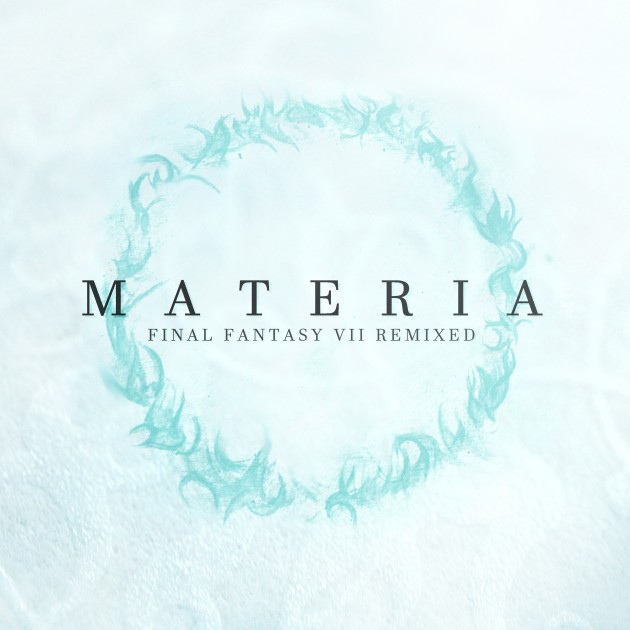
And then for Final Fantasy VIII, the main theme is one of my favorite video game soundtracks of all time so as soon as Isaw we’re doing VIII, I said, “Please, I just really want to do the end game theme,” so I had no idea if other people tried to do it. The way it works is you just submit your request and wait and hope they let you do it. We got lucky that we got chosen to do the ending theme, because I have been listening to that since middle school. I was very excited.
Emily: I realize I might get different answers from the four of you, but…favorite arrangement that you’ve done so far?
Chad Schwartz: Ooh I’ve never heard you guys answer that – that’s pretty interesting i will let you guys go first
Jacob Roege: Um…favorite arrangement?
Emily: Favorite arrangement that you have played for the quartet.
Jacob Roege: No, someone else go!
Chris Ferrara: Mine would be The Legend of Zelda.
Chad Schwartz: Really?
Jacob Roege: Yeah, I think –
Chris Ferrara: That is one of the best –
Jacob Roege: That’s always fun to play.
Chris Ferrara: It’s either that the Final Fantasy boss medley for me.
Chad Schwartz: Yeah the Final Fantasy boss, which is insane and intense and crazy especially for Chris and Jake.
Emily: The boss themes are so fast paced, weird rhythms, weird keys…[laughs]
Stanley Beckwith: I think they fit [Chris’ and Jake’s] personalities pretty well!
Chad Schwartz: I just arranged the Final Fantasy IX song “Melodies of Life.” Basically I have a friend that recently got married and it was actually during the crazy snow storm here, and I didn’t realize she asked us to do “Melodies of Life,” I just saw Final Fantasy IX, and I said it was one we already had. But then a week before the wedding I didn’t want to say, “Oh, we actually can’t do it because I didn’t really read it thoroughly,” so I decided to arrange it for the wedding. But then of course we had two feet of snow, and I was the only one that made it, so I ended up playing on my own. But, we are going to play it tonight, and she is going to be there so we will be able to play the full arrangement.
Emily: Are we going to get recordings tonight of any of the pieces?
Chad Schwartz: I don’t know if there is a recording, but MAGfest might be streaming it. I really have no idea – this is the first year they’ve done this after party, so I don’t know exactly how it’s working.
Emily: I actually only heard about the after party from you guys first before hearing about it from other people today, so it seems like it’s going to be a good thing!
Chad Schwartz: Oh, that’s a good sign! [laughs]
Emily: Any closing statements for fans and followers of the Triforce Quartet?
Jacob Roege: I think bottom line is, we love doing video game music and we want to be able to do more and more and more of it. We want to go to more places and play for more people and see those faces at the end of the show, and see people say, “Wow that was a string quartet? What was that?!” We love that kind of reaction.
Chad Schwartz: Their reaction never gets old, and hearing the stories like “I heard this group…wait, that’s you?”- that just blows my mind. I still can’t believe –
Jacob Roege: That wedding video that you starred “Zelda’s Lullaby” for the first dance –
Chad Schwartz: Oh yeah someone just set up a video using our version of “Zelda’s Lullaby” for the first dance at their wedding; that stuff is what really keeps us going. It’s just amazing.
Stanley Beckwith: We really get to share the music that we love with people, and that is one of the coolest things that we do.
Chris Ferrara: I think it is also great that most of the population doesn’t know about string instruments intimately, and so when they see a traditional quartet playing something like “Final Fantasy Boss Medley” where you are shredding like a guitar, they are kind of shock, they get blown away, they didn’t know it was possible. For me, anyways, I want to continue doing it for that reason, to open up people’s mind a little bit and say to them, “Hey, maybe you should try out going to a chamber concert and hear some medleys from Beethoven, too.” I think it will blow them away if they get into a setting like that – a recital hall with a duet or quartet or something.
Chad Schwartz: Similar to Chris, I like being able to be that liaison to classical music. A lot of people who never really thought about listening to classical music might show up at one of our concerts and hear it and understand it so much better. Maybe they will all end up appreciating classical music more! Even if they don’t become the biggest fans, they will understand it better and they will appreciate it more because they have that nostalgic feeling with the video game music, and they can get the same feeling with classical music.
Chris Ferrara: The string quartet also has a really rich history. Haydn, Mozart, Beethoven, all these guys put their most precious stuff into the string quartet, so even though they created all of these amazing symphonies and works, the string quartet was always held in high esteem. So when you go listen to a Beethoven quartet, even from his middle and late periods, the amount of emotion that is packed in there is just unbelievable. Even after Beethoven, Mendelssohn wrote some stuff, but a lot of composers afterwards were afraid to approach the genre – Debussy and Ravel wrote one string quartet, and Bartok came along, and Shostakovich wrote some, but it was really brought to this pedestal, and so it’s great to be able to play string quartet with music that’s really accessible, and direct people towards this genre.
Stanley Beckwith: We have this living art form that is our cultural heritage that people just don’t realize is still vibrant and going on today. I think for me the word “classical” is such a misunderstood word; everyone heard of a classical instrument, but then I go by with my violin and play Zelda or something, and they are really happy and they recognize it!
Emily: It definitely makes the medium more approachable for people who aren’t used to that set of instruments. They can have a method to identify with the instruments before trying out something like a Beethoven quartet.
Chris Ferrara: It’s great! There are a lot of groups out there now that I think are doing it in the right way. It’s really, really great.
The Triforce Quartet can also be found on Facebook and on their official website.
Posted on April 27, 2016 by Emily McMillan. Last modified on April 28, 2016.


